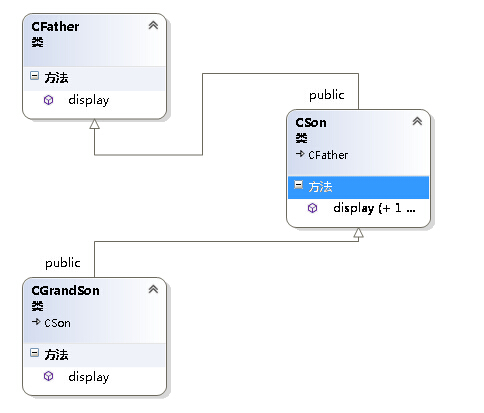类图:

代码:
#include <iostream> using namespace std; class CFather //父类 { public: virtual void display() const { cout<<"CFather::display()"<<endl;} //一般虚 }; class CSon:public CFather //子类 { public: void display() const { cout<<"CSon::display()"<<endl;} void display(int iSonRec){ cout<<"CSon receive one number:"<<iSonRec<<endl;}//形参个数上的区别 }; class CGrandSon:public CSon //孙 { public: void display() const { cout<<"CGrandSon::display()"<<endl;} }; void show(CFather *ptr) //一般函数,父方法show { ptr->display(); } void showson(CSon *ptr) //一般函数,子方法show { ptr->display(); } int main() { CFather father; //父实现 CSon son; //子实现 CGrandSon grandson; //孙实现 //以下传参,一般虚函数的传递性 show(&father); show(&son); show(&grandson); showson(&grandson); //有参数区别 son.display(1099); getchar(); return 0; }
结果:

总结:派生类没有显式给出虚函数,判断派生类的一个函数成员是否为虚函数:
1,该函数是否与基类的虚函数同名
2,该函数是否与基类的虚函数有相同的参数个数及参数对应类型
3,该函数是否与基类的虚函数有相同的返回值或者满足“c++ 基类,派生类的类型兼容性”的指针,引用(别名)的返回值。
满足以上条件,自动确定为虚函数,且覆盖了基类的虚函数,还会隐藏基类同名函数的所有其他重载。